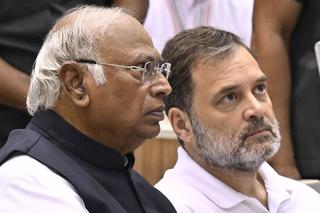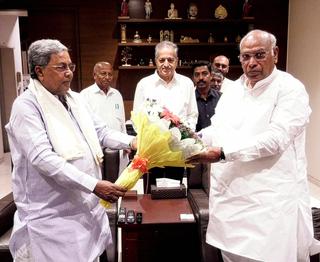In a striking intervention in Karnataka’s political crisis, Congress MLA Ramesh Jarkiholi has publicly cautioned the Bharatiya Janata Party (BJP) against attempting to destabilize the current Congress-led government. His remarks come amid mounting speculation that the BJP could exploit emerging intra-party rifts or alleged dissent to dislodge the administration and force fresh elections.
Jarkiholi’s Warning: Political Stability Over Partisan Gain
Speaking at a press conference, Jarkiholi emphasized that any attempt by the BJP to engineer a fall of the Congress government would be deeply harmful to public trust. He framed his warning in moral terms, arguing that Karnataka citizens voted for the Congress with certain expectations — stability, welfare, and governance continuity — and these aspirations should not be undermined for partisan advantage.
He further stressed that resorting to political opportunism would open a dangerous precedent. According to him, a successful bid by the BJP to topple the government could even weaken democratic institutions. Instead of viewing a fragile or divided opposition as a chance for personal gain, Jarkiholi appealed for restraint, saying that political responsibility demands protecting the government, not exploiting its internal challenges.
Jarkiholi’s Broader Message: Democracy First, Elections Later
Beyond his immediate warning to the BJP, Jarkiholi’s words also carried a broader message to his own party. He urged Congress legislators to avoid factionalism and intensify internal dialogue. For him, what matters most is keeping the government intact so that it can continue delivering on its key policy goals: improving education, improving rural infrastructure, and strengthening social welfare.
He acknowledged that all political parties naturally face internal tensions, but said the right way to resolve them is within party mechanisms — not through outside manipulation. In his view, Congress must confront its differences transparently and constructively so that governance does not come to a standstill. By doing so, he believes the party can preserve its credibility with the electorate and avoid the kind of chronic instability that damages governance.
Jarkiholi also appealed directly to Karnataka’s people, telling them that democratic accountability does not require instant elections. He argued that governance can improve if the current government stays intact and delivers on its promises, rather than being subjected to a constant cycle of instability and re-election.
Risks and Bigger Implications If BJP Acts
If the BJP were to attempt to bring down the Congress government, the fallout could be significant and wide-ranging, according to political analysts. Firstly, it could erode the institutional strength of the state assembly — constant toppling and reformation of government undermines both policy consistency and public faith in elected representatives.
Secondly, a successful congressional government ouster could embolden the BJP to replicate this strategy elsewhere, signalling that legislative numbers matter more than mandate legitimacy. This could, in turn, create a political environment where governance becomes transactional rather than ideological, with shifting loyalties and alliances overshadowing policy priorities.
Thirdly, the people of Karnataka — especially the underprivileged and marginalized who depend on state welfare schemes — might pay the heaviest price. Dislodging a government midterm can disrupt important welfare programs, delay project execution, and create administrative chaos. In Jarkiholi’s words, “the cost of political instability is not borne solely by politicians; it is borne by the people.”


Conclusion: A Plea for Responsibility
Through his public remarks, MLA Ramesh Jarkiholi is making more than a political point: he is issuing a moral plea. He is asking rival parties, especially the BJP, to think beyond short-term gains and to consider the long-term well-being of Karnataka’s people and its democratic institutions. His appeal for stability, even amid internal challenges, suggests a deep-seated belief that good governance should come before partisan advantage.
Ultimately, Jarkiholi is reminding all stakeholders that democracy is not just about electoral numbers; it’s about responsibility. Getting through a crisis without tearing the government apart, according to him, is the true test of political maturity — and the legacy that should define Karnataka’s present leadership.


Jarkiholi’s statement has also sparked a conversation about political ethics within Karnataka’s democratic framework. Many believe that his words highlight a rare example of political thought that places public administration above party rivalry. At a time when defections, engineering resignations, and coalition collapses have become common tactics in India’s state politics, his appeal stands out as a plea to restore dignity to the electoral mandate. By focusing on safeguarding the government instead of fueling instability, he attempts to shift the conversation from strategy to responsibility.
The timing of his intervention is particularly significant. Karnataka is facing intense political speculation, as several Congress legislators have recently been seen travelling to Delhi to meet the central leadership. This has created assumptions of internal conflict and leadership tussles within the party. In such a climate, the opposition could easily see an opportunity to gain advantage. Yet, Jarkiholi’s caution tries to cut off that possibility by warning that opportunistic moves would be viewed as disservice to democracy rather than tactical brilliance.
Furthermore, Jarkiholi’s appeal reflects a larger anxiety among legislators who fear that repeated political disruptions could leave voters disillusioned. Many lawmakers worry that if the government fails to complete its tenure, the blame might not only fall on any external attempts to destabilize it, but also on the Congress itself for failing to maintain unity. This creates pressure on the ruling party to settle internal issues quickly and prevent any perception of weakness that could be exploited.
Another underlying factor in Jarkiholi’s statement is the message it sends to his fellow Congress MLAs. By asking the BJP not to interfere, he implies that the Congress must first focus on cleaning up its own house. The appeal indirectly urges legislators to avoid providing opportunities for outside forces to intervene. This suggests a call for internal discipline, stating that even if disagreements exist, they should not spill into the political arena where they can be used against the government.
At the grassroots level, his warning resonates strongly with voters who are fatigued by political drama. Karnataka citizens have repeatedly witnessed the fall of governments well before their terms, resulting in stalled projects, shifting budgets, and long periods of administrative confusion. For a villager waiting for irrigation support, or a student relying on scholarship continuity, political instability does not appear as strategy — it appears as disruption to daily life. Jarkiholi’s stance thus positions stability as a service to the public.
Another layer of his argument is that disruption can also weaken the image of Karnataka nationally. The state has been viewed as one of India’s most progressive economic and educational hubs. Frequent leadership crises could undermine investor confidence and administrative credibility. In that sense, Jarkiholi’s remarks extend beyond party politics and touch the larger ambition of building Karnataka as a stable governance model. Instability, in his view, is bad not just for the Congress, but for the state’s overall trajectory.
The moral angle in his statement also triggers debate about how governments should be judged. Should they be evaluated based on how long they stay stable, or by how efficiently they deliver development? Jarkiholi seems to argue that stability is a prerequisite for delivery. Without time, continuity, and clear leadership, policies remain trapped on paper. His view suggests that before measuring performance, one must first ensure that the administration is allowed to function without fear of interruption.
Critics, however, point out that political appeals alone cannot guarantee stability. They argue that the Congress must demonstrate visible unity if it wants its plea to be respected. According to this counter-view, appealing to the BJP not to destabilize the government is only half the work; the other half is ensuring that the Congress appears prepared to govern without internal fractures. Thus, Jarkiholi’s statement, while moral, also subtly pressures his own party to display cohesion rather than confusion.
Despite criticism, his intervention may ultimately help reduce political tension by bringing public attention to the consequences of government collapse. When debates move from backroom strategies to public ethics, political actors become more cautious about how their actions will be received. In this scenario, the BJP may find itself scrutinized if it attempts to topple the government, and the Congress may face public frustration if it fails to manage its own leaders. The warning creates a shared accountability narrative.
As the situation unfolds, Jarkiholi’s remarks could become a turning point in Karnataka’s political discourse. If parties choose restraint, the government may finally receive the space it needs to fulfill its mandate. If they ignore the plea, the state could be dragged back into another cycle of instability and election speculation. Ultimately, the coming months will reveal whether Karnataka’s leaders heed the call for stability or succumb once again to the lure of power games. For now, Jarkiholi’s voice stands as a reminder that the true test of politics is not winning power, but preserving the people’s mandate with honesty and respect.
As the situation unfolds, Jarkiholi’s remarks could become a turning point in Karnataka’s political discourse. If parties choose restraint, the government may finally receive the space it needs to fulfill its mandate. If they ignore the plea, the state could be dragged back into another cycle of instability and election speculation. Ultimately, the coming months will reveal whether Karnataka’s leaders heed the call for stability or succumb once again to the lure of power games. For now, Jarkiholi’s voice stands as a reminder that the true test of politics is not winning power, but preserving the people’s mandate with honesty and respect.
Follow: Karnataka Government
Also read: Home | Channel 6 Network – Latest News, Breaking Updates: Politics, Business, Tech & More

